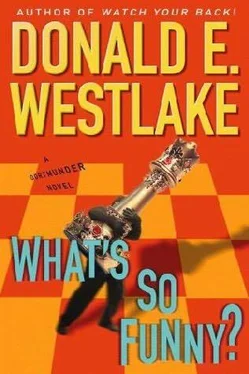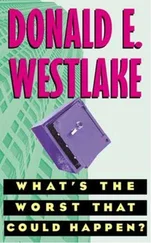Everybody thought that was brilliant. Tiny said, "Kid, you're an asset."
"Thank you, Tiny."
Judson beamed all over. Since he also looked as though any second he might start to blush, everybody else went back to looking at the pictures and talking to one another, Kelp saying, "So when we do our own little switcheroo, we want to make sure we don't do this guy."
Dortmunder said, "What do you mean, our own switcheroo? We got a vault between us and them, remember?"
Stan said, "I gotta say, from my perspective, it does seem worth the effort."
"Effort isn't the question," Dortmunder said. "The vault is the question."
"So let's ask the kid," Tiny said. "Kid, you solved the mystery of the rook; very good. Here's question number two: How do we get into the vault?"
Judson looked surprised. "We can't," he said.
DORTMUNDER JUST SAT there and let the conversation wash over him, like a hurricane over a levee. To have his own conviction of the impregnability of the C&I International vault confirmed by Judson Blint — out of the mouths of babes, as it were — merely put the rat poison on the cake. It was all over, in the immortal words of Charles Willeford, except the paperwork.
The others around the table didn't want to believe it. "There's always a way to do anything," Stan insisted.
"And if there isn't," Kelp said, "you make one up."
"Exactly."
"So make one up," Tiny suggested.
The silence that ensued was brief but telling, before Stan said, "Well, you can't do a bomb scare."
"Nobody," Tiny pointed out, "said you could."
"The idea with a bomb scare," Stan went on, "is they evacuate the building, then you can do what you gotta do, but it doesn't work that way. You try a bomb scare around this town, the building doesn't evacuate, it fills up to the brim, with cops, firemen, insurance adjusters, short con artists, farmers' markets, and documentary filmmakers. So forget the bomb scare."
"I'll do that," Tiny said.
"And you can't overpower the lobby guards," Kelp said, "you know, with handguns and masks and sets of cuffs and all that, on account of the camera surveillance."
"That's too bad," Tiny said. "It sounds like it might've been fun."
"Well, it won't work that way," Kelp advised him.
"So here's a question," Tiny said, and everybody except Dortmunder looked alert. "Let's say," Tiny said, "somebody went in there in disguise, to look like one of the people got the okay to go down to this vault. Not me, one of you guys. In a suit, shine up your shoes, like that."
Kelp said, "I think you gotta show ID."
"ID is not a complete impossible," Tiny said. "For instance, you follow one of the bank execs home one night, out to Connecticut, you come back with the ID, family finds him next morning, healthy but tied up and gagged in a car in a commuter railroad parking lot."
They thought about that, then turned to Dortmunder. Kelp said, "John?"
It was his own house, so he couldn't even go home. He roused himself to say, "Special elevator down from the lobby, special card stick into the elevator door, don't know what extra stuff they got downstairs, but the lobby guards know all the execs or they get fired."
"Also," Judson said, just to sink that boat one more time, "it weighs almost seven hundred pounds. You're gonna look funny carrying that in your suit."
Into the next silence, Stan inserted, "What if—?"
They all, except Dortmunder, looked at him. Kelp said, "And?"
"I was just thinking," Stan said. "About safe-deposit boxes, you know. One of us gets a safe-deposit box, then we got a legitimate reason, go down to the vault."
"I think," Kelp said carefully, "it's a different vault, or a different part of the vault. Am I right, John?"
"Yes," Dortmunder said.
Tiny said, "Dortmunder, I didn't see this place, I don't have it in my mind. We've got a lobby, we've got a bank, what've we got here? Walk me through it."
"It's a big building," Dortmunder told him. "Sixty stories high, half a block wide. The bank branch is on the corner, with its own way in and out. Lobby's in the middle, no door, anyway no public door, between them. On the side of the lobby away from the bank wall you got shops, inside shops, no street doors. At the back of the lobby you got your elevators and the special elevator."
"These lobby guards?"
"On the left, by the wall separates you from the bank."
Tiny nodded. "All very open," he said. "You're not gonna wheel that thing on a dolly across that lobby."
"As," Dortmunder said, "I said."
"Air ducts," Stan said.
Tiny looked at him. "You wanna push a seven-hundred-pound chess set through a building's air ducts? What about when they go vertical?"
Kelp said, "Street repair crew. Set up outside, dig down, run your tunnel under the sidewalk to the—"
"On Fifth Avenue," Judson said.
Kelp paused, frowned deeply, and shook his head. "Never mind."
Stan said, "I know where I can get hold of a helicopter."
Tiny said, "I don't know what you're gonna do with it."
Kelp said, "What if we did set fire to the lobby? We come in dressed like firemen—"
Dortmunder said, "Marble doesn't burn."
The silence this time was uncomfortable from the very beginning, because everybody knew at once it was the final silence, but nobody wanted to be the one to declare the session over, the cure not found. Finally, Judson cleared his throat and said, "You got a nice warm radiator here, but maybe I oughta, I don't know, probably time to…"
"Me, too," Stan said, stretching as though he'd been asleep a long time.
So then everybody moved and stood up and walked around, except Dortmunder, to whom they all said good-bye as though he were somehow both the bereaved and the dearly departed. Dortmunder nodded, but did not stand.
Tiny, on his way out, rested a giant paw on Dortmunder's shoulder, adding to the weight of his burdens, and said, "If you don't like San Francisco, I got another suggestion. Biloxi."
Dortmunder shook his head. "Eppick—"
"I said Biloxi," Tiny reminded him. "Biloxi, Mississippi. Trust me, Dortmunder, they still won't talk to a Northern cop down there."
THE LOBBY OF the C&I International building did not look as Judson had expected from John's description. The openness, largeness, and airiness had somehow been left out. The space must have been three stories tall, sheathed in creamy mottled marble, with a sweeping wall of glass to face the street. The place mostly reminded Judson of a cathedral, particularly on a cloudless Sunday morning like this, with the thousand rays of thin November sun reverberating every which way through the lobby, reflected from all the other glass-and-steel buildings along the avenue.
It was like standing inside a halo. How could anybody ever bring himself to steal anything in a place like this? Never mind all the light, it was the saintliness that deterred.
And yet it was a bank. Over there were the two guards, behind their chest-high counter, the monitor screens set into the wall up behind them.
Would one of those screens show the vault, or at least the entrance to the vault? Why not?
Judson moved in the direction of the monitor screens, looking at black-and-white pictures of hallways and empty elevators, until he became aware that the guards were, in their turn, looking at him. Not because they suspected him of anything, but because he was the only thing they could see that was in motion. The shops on the other side of the lobby were closed on Sundays, and so were many of the offices on the floors above.
Belatedly deciding it would be a mistake to draw a lot of attention to himself, Judson veered from his monitor-bound route toward the register instead, deeper along that wall. They would think he was merely looking for one of the tenants here, wouldn't they?
Читать дальше












